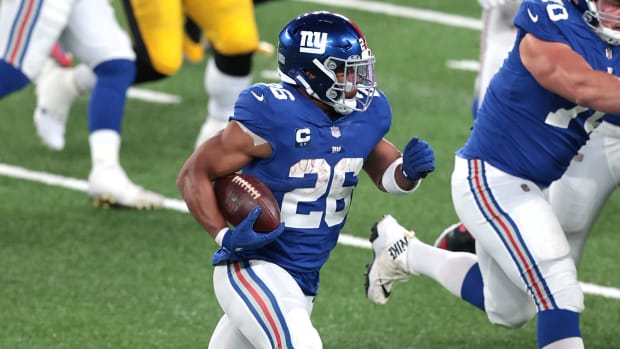The former No. 2 overall pick rushed for six yards on 15 carries in Monday night's loss to the Steelers.
To watch Saquon Barkley try and hurdle defenders on every small whiff of open field is like watching someone try and weave a Lamborghini through Jersey Shore traffic on a particularly beautiful Saturday in July. Every ounce of free pavement is a beautiful display, but unfortunately there is not nearly the room to legitimize breaking the thing out of the garage in the first place.
The player the Giants took No. 2 overall in 2018 has been trapped like this for the better part of two seasons; a superstar enveloped by the reality of a roster overhaul that is taking far too long. There have been moments of brilliance, sure. Rare moments when their personnel can overwhelm an opponent to give Barkley the ounce of space he requires to create havoc. But the fact remains after a Giants season-opening loss to the Pittsburgh Steelers at MetLife: Barkley is a valuable asset, but one that is needlessly depreciating in a place that cannot facilitate his best right now.

Let’s call this a pre-overreaction. An overreaction that is meant to cook slowly over the course of the early season. But if the first few weeks of 2020 continue to unfold in a similar fashion, the Giants have to begin considering a world where moving Barkley and maximizing his return while another club might be willing to deal a first-round pick isn’t a totally outrageous concept.
Fifteen carries for six yards against one of the best defensive lines in football is not a cataclysmic moment in itself, but this is not an isolated issue. Eight carries for 10 yards against the Buccaneers last season. Thirteen carries for one yard against the Jets. Games in which Barkley was brilliant and statistically dominant—189 yards against Washington last year, 112 yards against the Dolphins, 170 yards against Washington during his rookie season—are nice for fantasy football players but are otherwise meaningless. If the Giants have to wait for games in which they can outmatch their opponents up front to utilize Barkley the way they want, then we will see more of the same wild vacillations in performance with little to show for it. Monday night, according to Pro Football Focus, anyone running the football for the Giants was first hit on average a yard and a half into the backfield.
Trading both Odell Beckham and Saquon Barkley would be a damning indictment of the Dave Gettleman era and the time that his master rebuild has taken. But would it be worse to have kept both of these players as mere museum attractions amid an otherwise punchless stretch for the offense?
If Barkley is smart he’ll insist on a new deal before the start of next season, the final non-option year of his rookie contract. The Giants will find themselves in a similar position that they did with Beckham—weighing the benefits of a long-term pact against the ever-present drawbacks. In the former case, their radical indecision made for an incredibly strange series of events where the Giants signed Beckham, dealt him and digested an unfathomable amount of dead salary cap space.
In this case, they’ll weigh the prospect of keeping Barkley long-term and hoping that, unlike most running backs, they’ll be able to legitimize a second blockbuster contract for a player who will be physically battered 15-25 times per week over the course of a 16-game season with a developing quarterback and offensive line beside him.
Joe Judge has come from a pair of programs that have won with a cadre of running backs filling various roles. Of the three Super Bowl rosters Gettleman has been a part of most recently (the 2007 and 11 Giants and the 2015 Panthers) only one had a 1,000-yard rusher that was somewhat of a singular focus for the offense. Brandon Jacobs, a fourth-round pick out of Southern Illinois, eclipsed the mark by nine yards in 2007.
Maybe the further removed we get from the 2018 draft, Gettleman will feel less of a wrath for taking a running back at No. 2 overall, especially if the left tackle and quarterback he got in subsequent years turn out to be successful. But squandering that talent and having nothing to show for it might refocus all of that negativity, especially when a proactive decision could have offered him an opportunity to dig out of that hole.